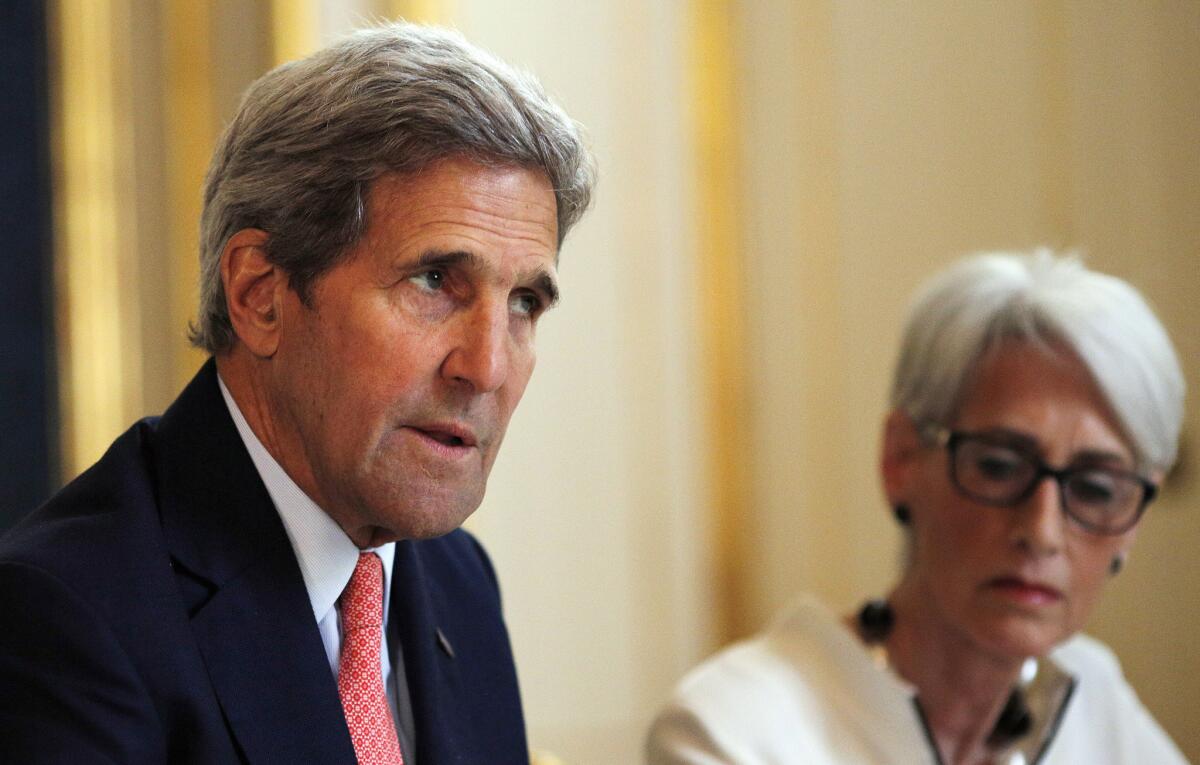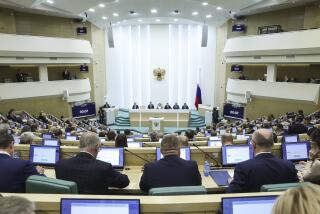Iran nuclear talks will go past deadline, officials concede

U.S. Secretary of State John F. Kerry and U.S. Undersecretary for Political Affairs Wendy Sherman attend a meeting with the Iranian delegation in Vienna on Saturday. Officials conceded they would miss a self-imposed Tuesday deadline to wrap up the nuclear talks.
The final round of international negotiations over a nuclear deal with Iran won’t finish by Tuesday’s deadline, diplomats acknowledged Sunday after weekend consultations.
Iranian Foreign Minister Mohammad Javad Zarif, who met U.S. Secretary of State John F. Kerry four times over the weekend, will fly to Tehran on Sunday night to talk to other senior officials, with plans to return to the Austrian capital on Tuesday. French Foreign Minister Laurent Fabius and German Foreign Minister Frank Walter Steinmeier also made plans to leave after short visits to the 19th century palace in Vienna, where the talks are taking place.
The Russian and Chinese foreign ministers haven’t arrived yet, instead sending deputies to represent them in the opening round of talks.
A senior Obama administration official said the negotiators have made some progress and insisted that the departures are not a bad sign.
“If people need to go back to their capitals for consultations with their leaderships, that’s a good thing,” said the official, who was not authorized to speak on the record.
While progress has been made on some issues, several of the principal ones remain unresolved, the official said, adding that diplomats would probably “stay a few days beyond the deadline.” The official ruled out the idea of extending the talks by several months, an approach that negotiators have taken in the past.
Iranian officials also predicted the deadline would not be met.
Tuesday’s deadline was self-imposed. The negotiators face a more consequential deadline in about a week because of legislation that gives Congress time to review any deal with Iran before the administration can implement it.
The legislation requires that the administration deliver the text of the deal plus all supporting documents to Congress by July 10, which would trigger a 30-day review period. Officials have said they would need a few days to prepare the documents for review. If the administration misses the delivery date, the review period would stretch to 60 days to take into account Congress’ recess in August, delaying any deal into the fall.
Both the Iranians and the administration and its allies would prefer to avoid that added review time for fear that delays could strengthen critics’ efforts to block an agreement.
Iran, the United States and five other countries -- Britain, France, Germany, Russia and China -- are seeking a deal that would lift international sanctions on Iran if it agrees to limits on its nuclear program intended to prevent it from obtaining a weapon.
Diplomats have generally predicted that a deal will be reached, though they have said more tough compromises remain necessary.
Federica Mogherini, the European Union’s foreign policy chief, said a deal could be reached in a few days, but conceded that the group would need to overcome serious differences.
An agreement would be “tough but not impossible,” she said.
Iranian officials said Zarif’s trip home had been planned for some time. He has generally avoided short trips to Tehran during past high-level negotiations.
The seven countries reached a preliminary agreement in April in Lausanne, Switzerland, and appeared headed to complete their bargaining. But there have been signs that the two sides may have moved apart on some issues since April.
Iranian Supreme Leader Ayatollah Ali Khamenei last week laid out a series of tough negotiating requirements that appeared to build new pressure on negotiators. He said Iran wouldn’t allow international inspectors access to Iranian military bases as part of their effort to monitor the country’s nuclear activities, for example, and would not permit interviews of Iranian scientists.
Iranian General Masoud Yasajeri repeated Khamenei’s assertions on Sunday, saying Iran wouldn’t put up with foreign powers trying to use U.N. oversight as a means to snoop on Iran’s military secrets.
In Israel, Prime Minister Benjamin Netanyahu accused the six powers of caving to pressure to close the deal.
There has been a “clear withdrawal from the redlines set by the powers for themselves,” he said. “This bad agreement is getting worse by the day.”
The seven countries still need to agree on a schedule for removing sanctions. Also up in the air is how world powers would slap sanctions back on Iran if it breaks the deal.
The two sides also have to agree on how quickly Iran will be able to add sophisticated centrifuges after the first decade of the deal. The six powers fear that if Iran moves too quickly to add such centrifuges, it will be able to produce enough enriched uranium to fuel a nuclear bomb.
For more on the Iran negotiations, follow @RichtPau on Twitter.
More to Read
Start your day right
Sign up for Essential California for news, features and recommendations from the L.A. Times and beyond in your inbox six days a week.
You may occasionally receive promotional content from the Los Angeles Times.







